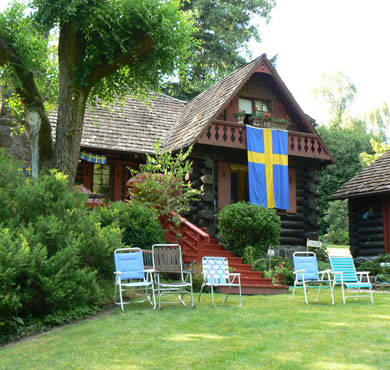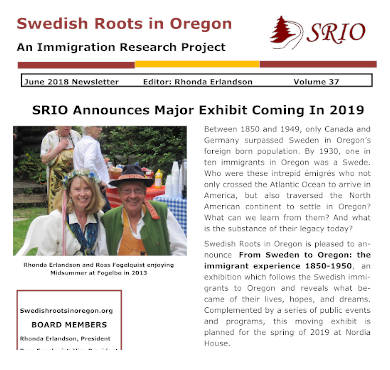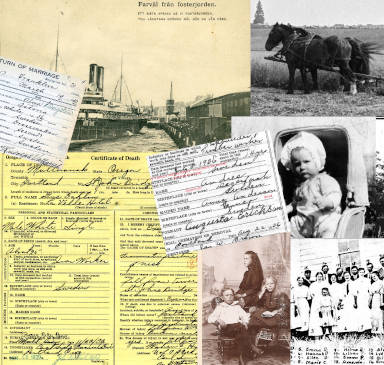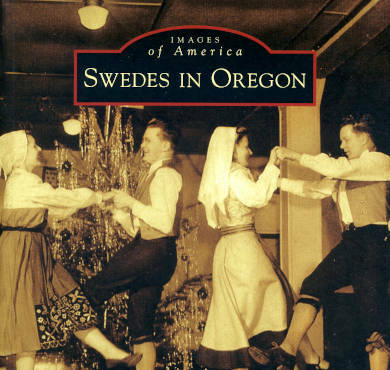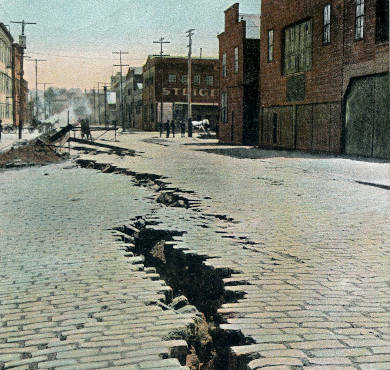The story of Anna Björkmans emigration to Oregon in 1890
Introduction
From the Swedish parish records we learn that Anna Björkman was born in 1871 in Bäck, not far from the small town of Rättvik in the province of Dalarna. She was the second in a family of five surviving children. The only things we know about her life in Sweden are the few glimpses alluded to in the well-crafted description of her emigration to America in 1890. Anna seems quite familiar with Stockholm, and often uses it as a point of comparison to the things she experiences during her journey—the size of cities, towns and train stations, or the type of streetcars that are in use. She also surprises us by saying that she “knows” (recognizes?) from Stockholm a young boy who has an accident during the ship’s rough Atlantic crossing. And finally, she refers to a specific address in Stockholm, “Nybrogatan No.16,” in a manner that suggests that it was well known to her family. Perhaps it was a place where she had been employed as a maid or a domestic.
From the Swedish parish records we can glean a few more snippets of family history. On July 6, 1887 (3½ years before her emigration), we learn that her father dies at age 42, and six weeks later her youngest brother is born. Perhaps it is these events that set things in motion. In October 1889 her oldest brother Anders Björkman leaves for America and comes to Portland, Oregon, becoming known as Andrew Birchman. Almost exactly a year later he sends her sister Anna a second-class ticket to the same city where he has secured a job for her as a maid in a well-to-do American household.
In Göteborg, Sweden, on December 18, while waiting to cross the North Sea to Hull, England, Anna starts a long letter to her family in Dalarna. The letter is presumably never mailed, but merges with her diary and evolves into a seamless description of her entire emigration journey. From a comment in the text (where she says that “I have heard stories over here …”) we realize that she must have completed the text at some later date in Oregon. Whether a copy the final text was ever sent to her family in Sweden we don’t know, but the original remained in the United States.
Anna Björkman was observant and skilful at describing things, and occasionally even includes a literary flourish. Many of her reactions and comments also reflect her keen awareness of class differences, her social aspirations, and her unwavering loyalty to her fellow Swedes. She does not engage in conversations with “rough talking” people, and again and again she lets the reader understand how grateful she is to her brother for not having to travel on a third class ticket. When Anna speaks to strangers she is meticulous with the formal and informal forms of the word “you” (“ni” or “du”) that was used in Swedish at the time. She also records interesting minutiae from the trip, such as attire, furnishings and food, and she is keenly aware of the cost of things – and how limited her funds are. (If one is to believe the text, the Swedish currency, the Krona, the “Crown” [which consists of 100 öre], had the following exchange rate in 1890: $1.00 = 3.65 Krona.)
Another interesting aspect of her experiences in 1890 is how often she runs into, and is assisted by, fellow Swedes in America. Of course, her ability to speak English is extremely limited (the book she is reading on the train is an English dictionary), and she naturally gravitates to any Scandinavian speaker for help, information or company. Among other things, her lack of English leads to misunderstandings, the most significant of which is that she never checks her trunk onto the train New York City. We never learn for certain whether or not she actually gets it forwarded to Portland, but it probably worked out in the end.
In 1974 the Swedish text, with an anonymous translation into English, was donated to the Oregon Historical Society. The donor was Margaret Freeborg, Anna Birchman’s oldest daughter. Margaret Freeborg was probably the translator of the text as well. To a Swedish-speaking reader it quickly becomes apparent that there are a few misunderstandings of the original text in the English translation, and these have been silently corrected. The English text has also been lightly edited for fluency and style, and in a few places obvious factual repetitions or mistakes have been eliminated.
Lars Nordström, Ph. D.
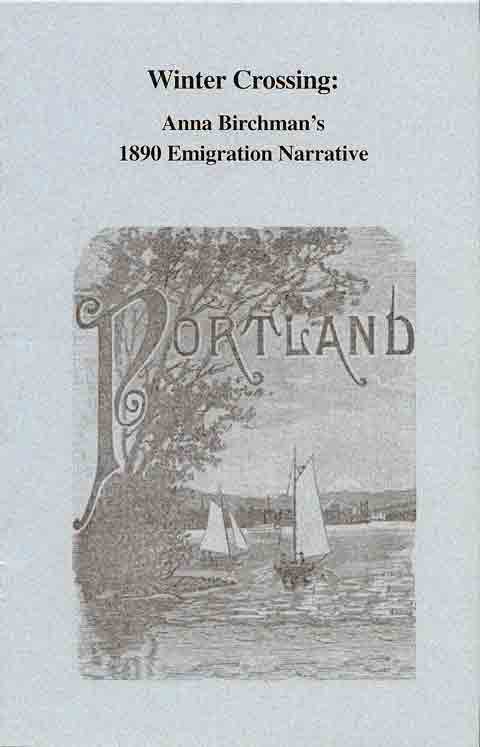
An excerpt from Anna Birchman’s Winter Crossing to America
When we had seen almost the entire town, it was time to go home. You must know Göteborg is not as large as Stockholm, no, not by a long shot. When I got home I ate some of the food I had in my basket and then I lay down to get some sleep. I slept until nine o’clock in the morning. Then I had some coffee after which I went out a little by myself. When I returned, I started writing this letter. Then this day was over too, and then the night—and so it was the last day.
When I went to the office at eleven o’clock Friday, the agent said I would have company on the trip, a lady who had been in America before and who was traveling second class all the way to Chicago. I felt a little relieved. Who would think of luck like that? I remembered Blans Brita’s words to me the last evening and I followed her advice—I didn’t feel sorry. I waited in the office a little while and soon the aforementioned lady arrived. She looked like a fine lady, and I got excited and didn’t know how to talk to her. However, under such circumstances one has to be bold so I went up to her and started to talk. She answered very politely and soon we were acquainted. I never mixed with the third class passengers, nor did I talk to them.
Among the third class passengers was a girl from Mora, but as I was not acquainted, I didn’t let on she was from my area because she didn’t look so very nice either. I had company now and would not mix in with their rough talk. At eleven-thirty we had to go with an agent to the courthouse to retrieve our passports, which we had left at the office before. After that we went to the steamer. A man was there to show us our cabins for the journey. One stairway down, midships, you came into quite a big room with a long table in the center and benches on either side, fine carpets on the floor and a very large mirror. Next to this salon were small rooms, and here Mrs. Westerdal and I got one small room together. It was very pleasant with neat, nice beds. The beds were made up with a down comforter and a heavy wool blanket. On top of these were more heavy wool blankets and then a fine bedspread. There was a small down pillow. We didn’t have to feel cold. Everything was fixed so nicely we could not wish for anything better.
It was around twelve o’clock when we got on board, and sharply at one o’clock the ship left the dock. About two o’clock, when the ship had left the shore, a man came in to set the table in the big salon. The man was old and homely but worked with order and cleanliness. We now had dinner served, and it was excellent. First we had soup and it was delicious; I thought, here I am going to have a swell time. Then we had meat and potatoes and that was very good. They were English potatoes and better than those we had at home. For dessert we had something I didn’t understand; I only knew it was good to eat. As I had not eaten anything during the day, only drunk coffee, I was very hungry and ate well. You could eat as much as you wanted. The old man I mentioned before, served. I must say that the plates, spoons, knives and forks were so clean and polished that the finest family in Stockholm could not have it any better.
After dinner we were allowed to move all over the ship. On deck it was less pleasant because it was snowing Friday, but it was not cold traveling second class. I took some of my medicine and didn’t expect anything bad. The ship went farther and farther out on the North Sea and began to roll and chop and be unsteady. I began to get a headache, but I thought I would not go to sleep at once, so I tried to keep myself up as long as I could. My friend didn’t show any sign of sickness. I didn’t show any sign of feeling bad either because it was not rough yet, if only it would not get worse. Mrs. Westerdal had some books to read and I borrowed one from her. I read and thought, “There is no danger yet.” Soon it was time for supper. I sat down with the rest and thought I should eat just as well as before. There were sandwiches, cold meat and tea. I made myself a sandwich and took some cold meat, but it would hardly go down. The food got larger in my mouth, if not before. I could not eat much but drank all the tea; that was good. My companion said, “I don’t believe Madame feels very good.” “Yes, certainly,” I said, “but I am not hungry.” When supper was over I started to read again. I thought I would not give up.
It was not yet nine o’clock when we went to bed. We did not undress, only took off our dresses because we could never be sure of things—at least not on the sea. In the big room there were two electric lights and in the little one, just one, but it was very bright and they burned all night. I soon went to sleep and slept all night, only waking up for a few minutes now and then. Mrs. W. woke me up at eight o’clock and asked how I felt, and guess who kept to her bed? As long as I was in bed I didn’t know I was sick. I wasn’t really sick either; I only thought so, but I didn’t dare get up, as I didn’t think I could. (I will not say I was sick on the North Sea, but I could not eat and sometimes that will happen at home too.)
As it was time for breakfast, the old man came to ask me if I would like to get up for breakfast, but I thought I better stay in bed for a while. They talked about how sick the people were in third class. That was no wonder because it was so unpleasant for them. It was a shame. I would have been very unhappy if I had had a third class ticket. They vomited and rolled among one another like animals, they said. I didn’t see it because I was sick and mostly slept. Dinnertime came, and I smelled the good soup but could not get up. He asked if he could give me a cup of soup in bed, but I didn’t dare to do that either and then I went to sleep and slept towards evening.
When I woke up I dressed in a hurry and went out into the salon. I was a little shaky but tried to be brave. I was, too. I took a blanket and a shawl and went up on deck to get some fresh air. I felt a little funny, which was reasonable, as I had had nothing to eat; my appetite was completely gone. I was almost mad when I thought of all the good things I could have had to eat and now they were all gone.
I sat on deck a good while and looked at the beautiful heaven and the waves. It was Saturday, about evening, and I know what I was thinking. Maybe you, mother, can guess what it was and not be surprised at it; it is nothing to think so much of. I have not yet shed one tear since I left the old country, and I didn’t do it now either even if I was a little feverish in my head. After a long time, I went down to the others. Remember, it was not only Mrs. Westerdal and I who used the salon. First, it was the funny old man and then two gentlemen who traveled second class who had their room opposite ours on the other side of the salon. Several of the crew spent a great deal of their time there. When I now came down, I felt fine and started to talk with the others. I had my ring on my finger and it caught the eye of everybody, especially an elderly gentleman who liked it because it was old-fashioned. He offered me 10 Kr for it, if I wanted to sell it, but that I would not do because it is a dear remembrance from Sweden and I would not sell it for $10, no, not even for $20.
Now it was time for supper and I thought I would eat, but could not even though it was so good. I drank two cups of tea and then we talked for a while. Mrs. W. and I went up on deck. The moon and stars were up in all their glory. We sang a few pieces and then went down to our room. I went for my lunch basket for now I was hungry. I had bought some eggs in Göteborg and I made myself a sandwich and ate three eggs all at once. After that I had a glass of fruit juice and water and it tasted good. Then I slept all night. When I woke up at six o’clock I was hungry, I’ll tell you—I could hardly wait for breakfast. Now I was feeling fine. I dressed hurriedly and went up on deck. The coast of England was now visible. We had breakfast and I ate for Saturday also.
We landed in good shape ten o’clock Swedish time, nine o’clock English time, but just because it was Sunday we were not allowed to go ashore before Monday morning. We were just as well off on the ship as we would have been on the streets of Hull. Hull is not beautiful, far from it. It is black with smoke all over. This we could see from the ship and those who went to town talked about how bad it was there. Children ran barefoot in the streets even though there was snow on the ground and very cold. The streets were dirty and dark and the Salvation Army was everywhere and cried as though they were crazy.
Six o’clock Monday morning we were allowed to leave the ship. We got coffee and sandwiches, good coffee but not like our Swedish coffee. Then we were off to the station. We didn’t have to open our baggage in Hull. I don’t know why.
At nine o’clock the train left Hull, but now I was separated from my companion because I traveled second class. Mrs. Westerdal, or Nelly, as her name is, and I were now so well acquainted we said “you” to each other and were like sisters. She didn’t have the same kind of ticket as I had and traveled third class from Hull. I would have been happier if I had gone third class because there were so many that they could keep warm while I was alone in my coach and nearly froze to death. It was cold in England, much colder than Sweden, and colder than the North Sea. There was snow too, but the sheep were outside anyway. It was not very beautiful across England, especially in the towns—dark narrow streets and dark houses. Out in the country it was quite pretty but I was so cold I could not see right. The train went very fast and it only stopped at the stations for one minute or so and then went on with the speed of the wind. I believe we went through ten tunnels and four of them were as long as the month of January. It seemed then to be as dark as in a grave and less pleasant.
At three o’clock we were in Liverpool and I was stiff from cold. I met my companion again, which made me very happy, and soon I got warm, but my bad foot started to bother me again. We went to the White Star Line Hotel where we were to stay until Wednesday when the ship was to leave. We took a cab, Nelly and I, because we had much to carry and it was very far to the hotel, besides, the streets were so dirty that it would have been very unpleasant to walk.
The hotel was an old, big house— unpleasant and not sanitary. We went into a small room where a cheerful coal fire burned in the fireplace. Now we could get warmed up. Second class passengers had to pay their own room and board in Liverpool. It cost [the equivalent of $2] for room and board for two days. There was plenty of good food but not as good as the ship. About four o’clock we had dinner. After that we went to our bedroom, which was on the first floor. It was not a large room but had a very high ceiling. We had one room to ourselves, Nelly and I. A bright coal fire burned in the fireplace, otherwise it was very cold. My foot was so bad I could hardly move it. There were two beds in the room and each was large enough for five people. We both slept in one bed; otherwise I suppose both of us would have frozen to death. I had never before in my life been as cold as that and Nelly said the same. But we were not depressed about it, because we knew we were not going to stay there forever, and we had as good a time as we could. The next day it rained terribly and we could not go out and look around. I think it is prettier in Liverpool than in Hull, but there were a great many raggedly dressed people and children.
I almost forgot to mention something funny, before we left Hull. We were taken to a big hall, almost like a school hall, where they examined our passports and where we got our train tickets to Liverpool. You should have seen the people there. They were not all Swedes, you know. There were people of all nations: Finns, Norwegians, Danes, Germans, Poles, Jews and others I cannot remember. I have never seen anything so funny. I laughed with all my might. One didn’t understand the other, and one talked louder than the other. They pushed and ran among one another. The Swedes crept into a corner by themselves like a flock of frightened sheep and only watched and laughed. We could do nothing but laugh. I am sure you would have laughed too if you had been there. The way they were dressed and the way they looked, each one looked worse than the other. The Swedes were the best. Among all this misery stood an old man who had fallen into the canal. Somebody helped him up and lent him some clothes and now he was standing there by a big stove trying to dry his coat and pants. He had to put them on again when they were only half dry and traveled like that to Liverpool in that cold. We saw him again in Liverpool at the same hotel where we were, standing beside the stove and still trying to get his clothes dry. Poor man, he was German.
